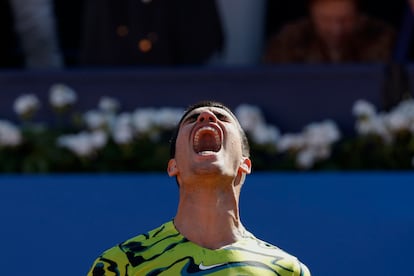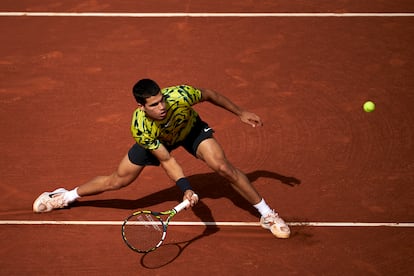Carlos Alcaraz, the last great virtuoso of tennis
The U.S. Open champion has picked up the baton from Roger Federer, Andre Agassi and the most creative players in the game with his instinctive and irrepressible style


“You can call me a genius because I’m outplaying many of my opponents, kind of maybe playing a bit different, winning when I’m not playing my best,” Roger Federer said back in 2007 as he was cementing his empire on the back of a 10th Grand Slam title at the Australian Open. That genius, which has led many to name Federer the greatest player ever to pick up a racket, was built on a game so fluid and esthetic that the writer David Foster Wallace defined watching him as a religious experience. The Swiss, who certainly was something of a genius, a conjurer without equal, left his mark on almost every tournament on the calendar, including at the Madrid Open, where after his retirement gasps of wonder can now be heard as Carlos Alcaraz passes by. Federer won in Madrid in 2006, 2009 and 2012, while Alcaraz, 19, is the defending champion. In the first edition of the tournament in 2002, played on carpet, Andre Agassi lifted the champion’s trophy.
“When you are 32 years old, everybody coming up behind you are the new generation,” said the American at the time amid the rise of Juan Carlos Ferrero, Marat Safin, Lleyton Hewitt and Federer, for whom Alcaraz has always held special appreciation. “I admire [Rafa Nadal] a lot. But Federer, the class he had, the way he got people to see tennis: That was beautiful. Watching Federer is like looking at a work of art,” said the Spaniard in February in an interview with Vogue magazine. Now that the much-vaunted Next Gen seems finally poised to take the baton from the Big Four, Alcaraz sets trends like no one else and is widely regarded as the new phenomenon because, beyond numbers, statistics, and records, the defending champion is the last great virtuoso of the racket. The last great creator. It is tennis, but in its most hedonistic version.
Regardless of the competitive footprint he may leave, Alcaraz has always held the idea of going down in posterity as a player with a unique, unmistakable, and spectacular style. Winning, yes, but not just winning for its own sake. The what matters, but also the how. “I only think about enjoying myself, because that’s how my best version comes out,” he said on his arrival at the Caja Mágica in Madrid, in front of an audience of around 100 journalists. “I want to enjoy myself and make people enjoy themselves. My style is very upbeat and I try to do different things; that’s what comes out of me when I’m enjoying myself and making myself smile.”
Despite is brief career among the elite, Alcaraz is already part of that lineage of singular and unique tennis players, capable of surprising day in and day out. The artists. He has plenty of tricks and his creativity stands out against a monotonous backdrop that has predominated the game in recent times, all speed and power, as few shots as possible and all from the baseline, tennis marked by a lack of strategic innovation. “I had heard about him. I heard that he did things differently from everyone else, going to the net a lot and throwing in a lot of drop shots,” says his coach, Juan Carlos Ferrero, whose day-to-day exposure to Alcaraz has done nothing to dim his amazement at the shots and ploys of an exceptional talent who eight months ago, coinciding with his maiden Grand Slam victory at the U.S. Open and his rise to world number one, was only playing at “60% of his real potential.”

Even at that time, Ferrero said that Alcaraz had plenty of room for improvement: his serve, his backhand, his consistency and not “switching off mentally.” Today, with three more titles to his name — including Indian Wells, where he became the first player since Federer in 2017 to win the tournament without dropping a set — those improvements appear to have taken hold. He is now a more complete player, the process of becoming one more accelerated than expected, or is normal; Alcaraz continues to define and differentiate himself, following a path previously trod by virtuosos such as Stefan Edberg, Marcelo Rios, Agassi and Federer, all exceptionally talented in terms of wrist action and technique. “None has the variety that [Alcaraz] has; you never know what he is going to do,” says Madrid Open tournament director Feliciano López. “If we’re talking about creativity, he is the best on the circuit,” said former U.S. Open winner Marin Cilic when the pair last met on court.
With Nadal and Djokovic having pulled out of Madrid, and Federer retired, all eyes will be on Alcaraz. “They are not there, but you always have Alcaraz, so...” said Stefanos Tsitsipas on Tuesday, having been beaten by the Spaniard in the Barcelona final last weekend. “He is a big obstacle for me. He has an enthusiasm for this sport [that is] difficult to find,” the Greek world number five, who has lost each of his four matches against Alcaraz. While others among the great generational talents, (Nick Kyrgios, for example) remain in the picture, Alcaraz stands out for the exceptional deployment of his ingenuity; risky but always in search of profit, at critical moments but beyond the desire to garner applause.
“We hardly practice drop shots; that is what we work least on because he pulls them out naturally,” Ferrero said during an interview on Spanish radio two days ago, remembering a Challenger event in Seville in 2019 when Alcaraz was 16. “He was doing too many of them, so when the second-set tiebreaker began, I got serious with him and told him not to play even one more drop shot. He promised me he wouldn’t, but two points later, he played one and won the point. He turned around and just told me he couldn’t help it...”
Sign up for our weekly newsletter to get more English-language news coverage from EL PAÍS USA Edition
Tu suscripción se está usando en otro dispositivo
¿Quieres añadir otro usuario a tu suscripción?
Si continúas leyendo en este dispositivo, no se podrá leer en el otro.
FlechaTu suscripción se está usando en otro dispositivo y solo puedes acceder a EL PAÍS desde un dispositivo a la vez.
Si quieres compartir tu cuenta, cambia tu suscripción a la modalidad Premium, así podrás añadir otro usuario. Cada uno accederá con su propia cuenta de email, lo que os permitirá personalizar vuestra experiencia en EL PAÍS.
¿Tienes una suscripción de empresa? Accede aquí para contratar más cuentas.
En el caso de no saber quién está usando tu cuenta, te recomendamos cambiar tu contraseña aquí.
Si decides continuar compartiendo tu cuenta, este mensaje se mostrará en tu dispositivo y en el de la otra persona que está usando tu cuenta de forma indefinida, afectando a tu experiencia de lectura. Puedes consultar aquí los términos y condiciones de la suscripción digital.








































